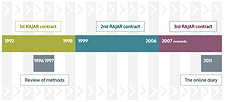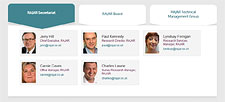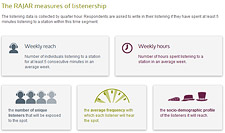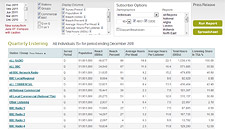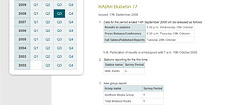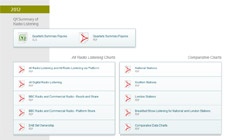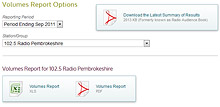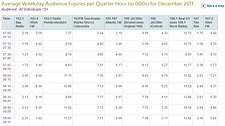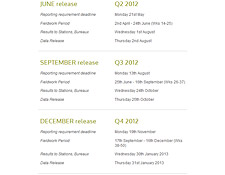RAJAR Bulletin 85
Issued: 17th September 2010
-
Data for the period ended 19th September 2010 will be released as follows:
Results to stations 1.30 p.m. Wednesday 27th October N.B. Publication of results is embargoed until 00.01 a.m. Thursday 28th October 2010
New station / group report
Station / Group name Survey Period Absolute Radio 90s Q Total Absolute Radio Network (London) Q Total Town and Country Broadcasting Y Total Choice (UK) H Stations / Groups name changes
From To Mercury FM (Herts) Heart 96.6 FM Hertfordshire (was Mercury FM (Herts)) Heart Essex (was Essex FM) (inc Ten-17 FM & Southend Radio) Heart Essex (was Essex FM) (inc Heart 101.7 FM Harlow & Southend Radio) Mercury FM (Surrey & Sussex) Heart Crawley and Surrey (was Mercury FM (Surrey & Sussex)) Kestrel FM - formerly DELTA RADIO KESTREL FM - was Delta Radio Star Radio in North Somerset Nova Radio – Weston (was Star Radio in North Somerset) Total Smooth Radio Smooth Radio UK Stations / Groups not reporting
Station / Group name There are no deleted reports in Q3 Period changes
Station / Group name From To NME Radio Quarterly Half Year Absolute 80s Half Year Quarterly Scottish AMs Yearly Half Year Revised TSAs
Station name From To The Bay 324,287 291,860 Changes to the survey
RAJAR amendments to Children’s Sample:
RAJAR has traditionally included children aged 4-14 in its survey. The UK has been unique in Europe in including children under the age of 9 in its radio audience statistics. Over the past few years societal changes have made it increasingly difficult to recruit a representative sample of children aged 4-9 despite additional resources being employed.
Following cross-industry consultation, RAJAR is to focus its efforts on improving the more relevant 10-14 year old sample, redirecting resource associated with recruiting 4-9 year olds into delivering a more representative and robust sample of 10-14 year olds.
This change will allow stations that include 10-14 year olds in their programming strategy to have even greater confidence in the data for this age-group.


